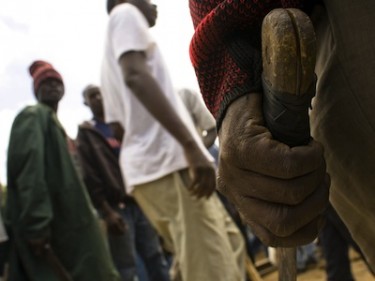
*The Minister for Finance in Kenya Uhuru Kenyatta used Twitter and Facebook to solicit public opinion on what to include in the country's budget for year 2010/2011 that was read on June 8, 2011. Interestingly, the budget estimates for the three East African countries were read on the same day. However it is only the Kenyan Finance minister (a copy of the Budget speech is readily available for download on the
Ministers Facebook page) who heavily employed social media.
The minister used
GoogleDocs (document now removed),
Scribd and
Facebook to solicit public opinion. He received a massive response. This is the first time that a Kenyan Finance minister used social media to gather public opinion.
Kenyans discussed the contents of the budget on twitter under the hashtags
#Budget2011 while the Finance Minister's team used
#keBudget2011. Live updates of the budget speech were tweeted by
@TeamUhuru and
@UKenyatta.
Kenya's netizens discuss the budget in a critical albeit positive light:
@LoiseKare says Uhuru's use of social media shows the difference between a leader and a politician:
..and he involved fellow tweeps in makin the budget..diff btwn a politician and a leader. Kudos @UKenyatta
@MissRipplez is convinced that the use of social media will affect the 2012 Kenya Presidential Elections:
Judging from #kebudget2011 n #teamuhuru I'm convinced that twitter will be a crucial ground for campaigns next year #kenyansontwitter
@Just_Wambui commends the minister and his Twitter team:
I'm thoroughly impressed by the efficiency in #kebudget2011 updates by @Ukenyatta and his team...great job!
Prior to the budget,
Zindua Kiongozi had this to say:
Don’t complain that you were not engaged in the budget making process for 2011 or at the least, that’s what Finance Minister Uhuru Kenyatta will say to any skeptics after Friday’s deadline to submit comments on the 2011 budget making process ends. The Minister has integrated his facebook page with a budget 2011 application that provides some simple instructions on how to pitch into the process
Budget 2011 on facebook
The Google Docs powered application allows citizens to make budget priorities and suggestions by providing a fill in form that categorizes the comments in key sector areas related to the budget. You have less than 48 hours to submit your comments and suggestions since the deadline runs up until the end of Friday the 13th of May.
SportsKenyaoffers some positive critiscism:
Quoting the statement,
"...apart from engaging in these activities, I would also like to encourage them to nurture their talents in the realm of sports. Time and time again, our young people have made this country proud by their exemplary performance in the international tournaments in various disciplines. (... all good so far)
I believe that a clear investment in sports backed by proper management, can turn this activity, which attracts thousands of our young people into a sustainable employer. Our youth should be able to follow their dreams and establish careers in sports ( ....well put Mr. Minister Sir)
To this end, I have allocated KShs. 210 million ( 1 million per constituency) towards competitive sports for youth countrywide. This will be used for purchase of trophies, monetary award to competing teams and compensation for officials overseeing this initiative. ( ...now you sound ambiguous Sir, which sports discipline & that amount's too measly unless you hold 1 tournament per year)
The private companies under their Corporate Social Responsibility (CSR) budgets to match this amount, at least on a shilling-for-shilling basis." (...nice one throwing the challenge to private corporate firms making obscene profits but committing measly amounts to sport BUT that word CSR word just craps me out! )
Not belabouring the points above, we believe there is more that the Ministry could have done to give incentive to the sports industry. Just like we have said before (and he's also quoted), sports can be an employer of many if the right investments and management are put into place.
In his analysis of the budget,
Blogger Kebati says that he was impressed by the Ministers words:
I wish to conclude with these are the words used by Hon Uhuru Kenyatta, Kenyan Finance minister as he concluded the budget 2011/2012 projections.
“It is important to note that 50% of these submissions were received from Kenyans
between the ages of 18 and 30 and I would like to specifically commend this group of young Kenyans who have taken it upon themselves to embrace technology and engage with the government through IT and social media, which I believe is the new frontier of public engagement. Mr. Speaker, I would also like to encourage you and members of the house who are not yet on these forums to join Facebook and Twitter and other similar platforms through which you can directly and constructively engage with Kenyans in real time”
As more Kenyans embrace social media, it is readily apparent that the citizenry is being empowered to be part of public policy making process. The Kenyan Finance Minister has demonstrated this in his Budget Speech for year 2011. Will more African leaders in Africa take the cue?
*
(This post was first published at GlobalVoices)






